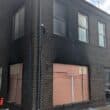August was the coldest in two decades, according to data released today, Thursday, by Armagh Observatory.
With an average temperature of just 14.2 degrees Celsius (57.6 degrees Fahrenheit), August 2014 was the coldest August for 20 years, that is, since 1994!
The month was nearly 1.2 degrees C cooler than the most recent (1981–2010) 30-year average temperature at Armagh for August, cooler even than the long-term (1796–2010) average August temperature at Armagh (14.6 degrees C).
This was also an exceptionally wet month, with a total recorded precipitation of 129.7 mm (5.1 inches), nearly 70% more than the most recent (1981–2010) 30-year August average rainfall at Armagh. August 2014 was the wettest August at Armagh since 2008. The wettest day was the 2nd, with 27.1 mm (nearly 1.1 inches) of rainfall.
The night of 23/24 August was exceptionally cold, with a minimum air temperature of 2.0 degrees Celsius. This was the coldest August night ever recorded at Armagh, that is, the coldest night for at least 171 years since before records of maximum and minimum daily temperatures began at Armagh in August 1843. There was also a ground frost that night, with a minimum grass temperature of minus 2.8 degrees C.
The warmest day (highest maximum air temperature) was 22.0 degrees Celsius on the 6th and the coldest day (lowest maximum air temperature) was 15.4 degrees C on the 10th. The warmest night (highest minimum air temperature) was 14.7 degrees C, which also occurred on the 6th.
Despite the prevailing cool, showery weather, there were approximately 151.7 hours of strong sunshine, nearly 14% more than the most recent 30-year (1981–2010) average August sunshine at Armagh but less than the two recent sunnier Augusts of 2012 and 2010. The sunniest day was 10.9 hours on the 22nd.
August marks the end of the meteorological summer (June, July and August). Taking summer 2014 as a whole, and despite the cool August, this summer has been slightly warmer than average at Armagh, approximately 0.23 degrees C (0.4 degrees Fahrenheit) warmer than the most recent (1981–2010) 30-year average summer temperature. There were also nearly 10% more hours of strong sunshine than the most recent 30-year average at Armagh. Total summer rainfall was nearly 9% more than the most recent (1981–2010) 30-year average summer rainfall at Armagh, the exceptionally wet August more than compensating for the much drier than average months of June and July.
These data refer to observations at Armagh Observatory, which has been recording the weather at Armagh since 1795.
Read more news:
Claims of intimidation as repossessed homes proving ‘impossible’ to sell
Thirty historic Armagh properties to open for Europen Heritage Days
Tesco rubbishes media claims of further Railway Street homes demolition
PSNI and emergency services to attend grand finale of Brownlow Festival
Warning after teenagers and young boy found with BB guns in Portadown



